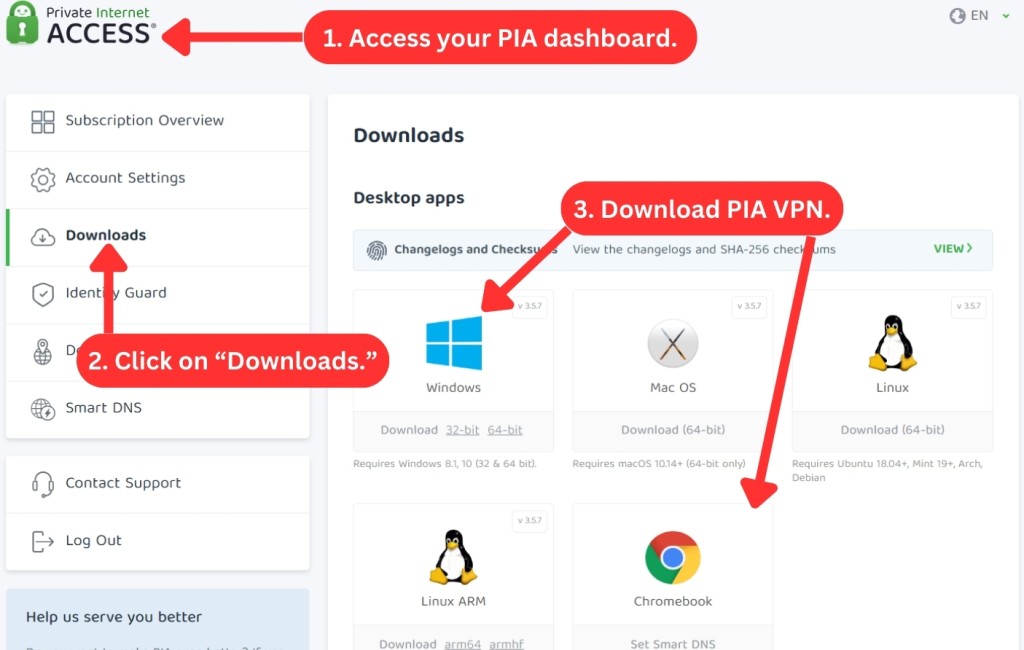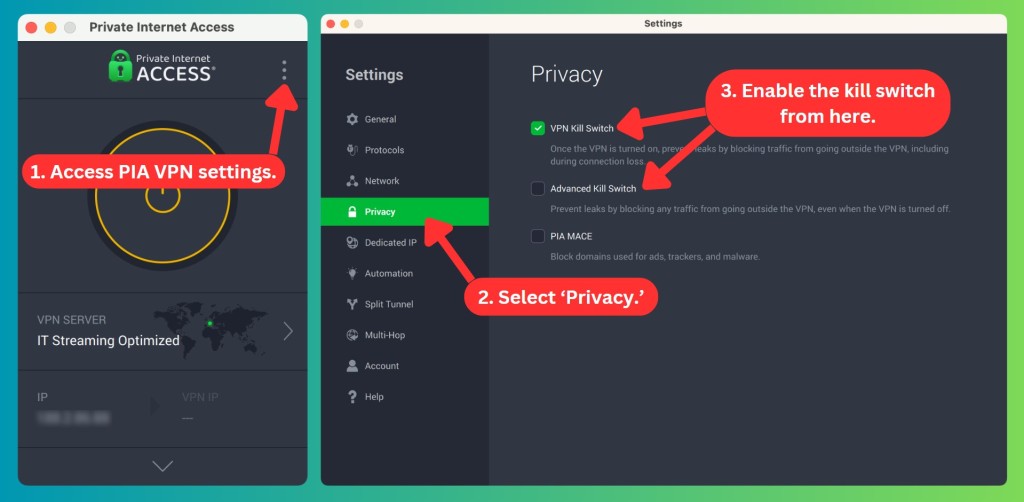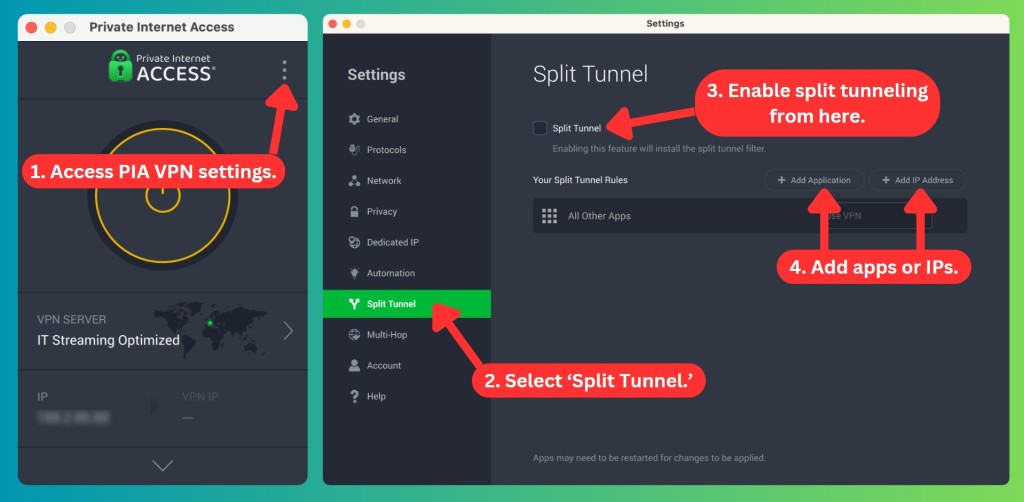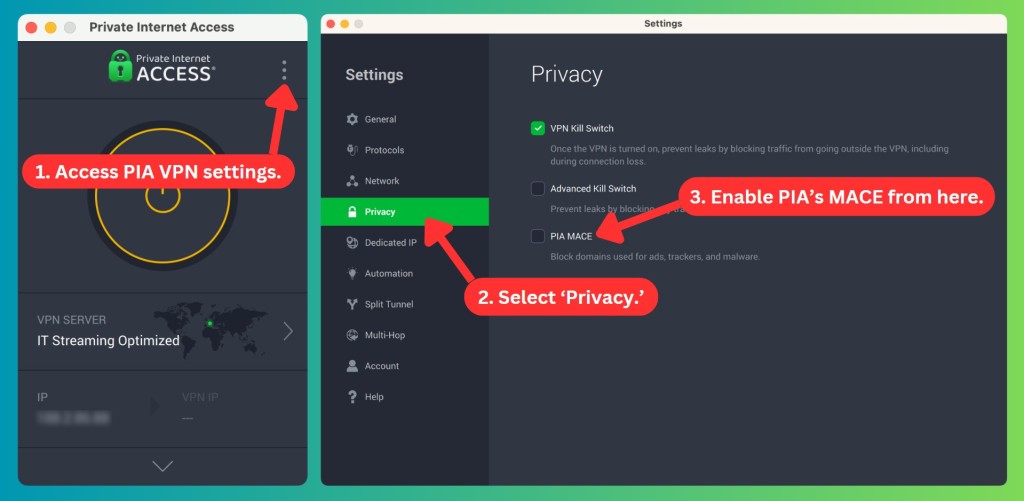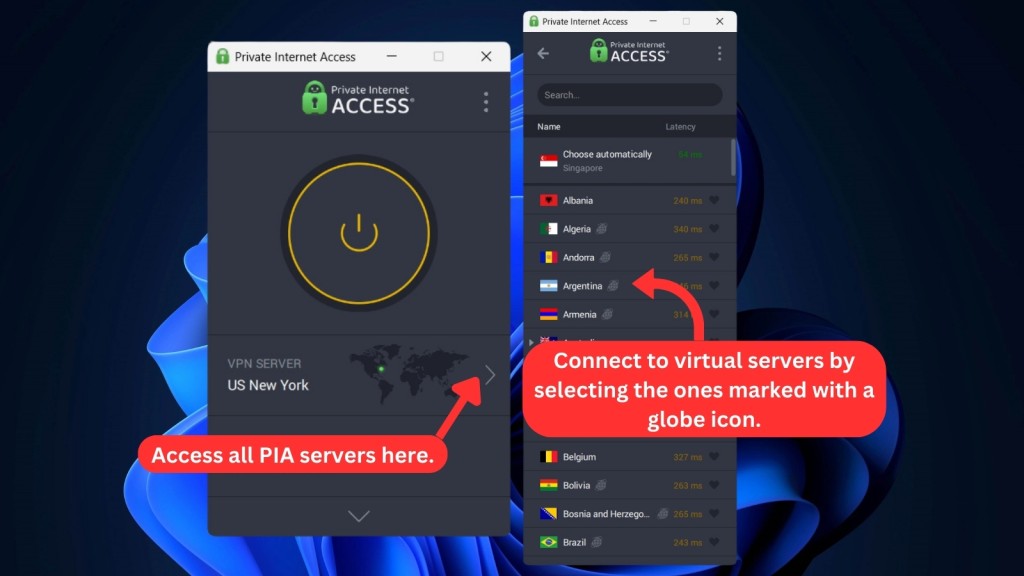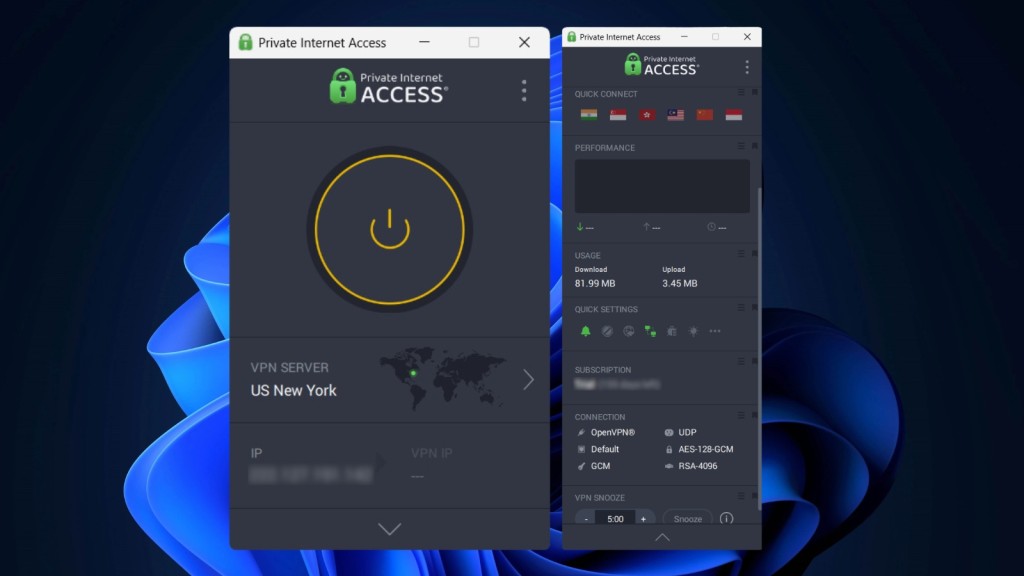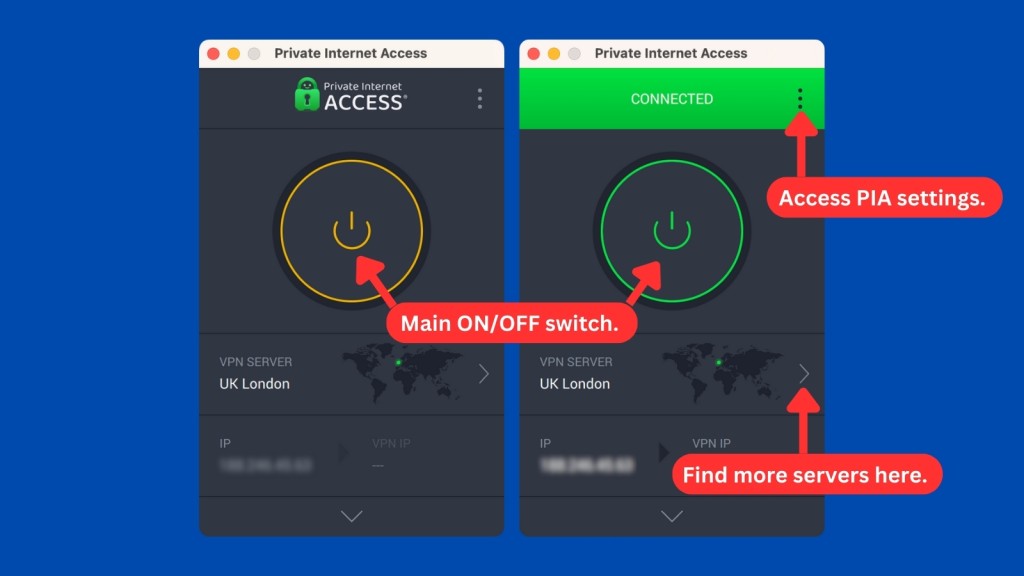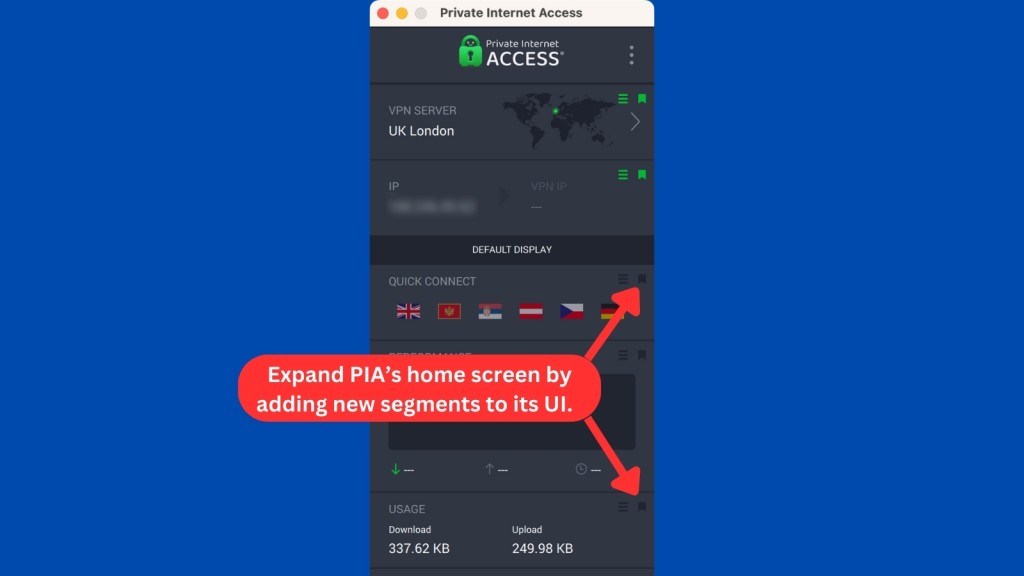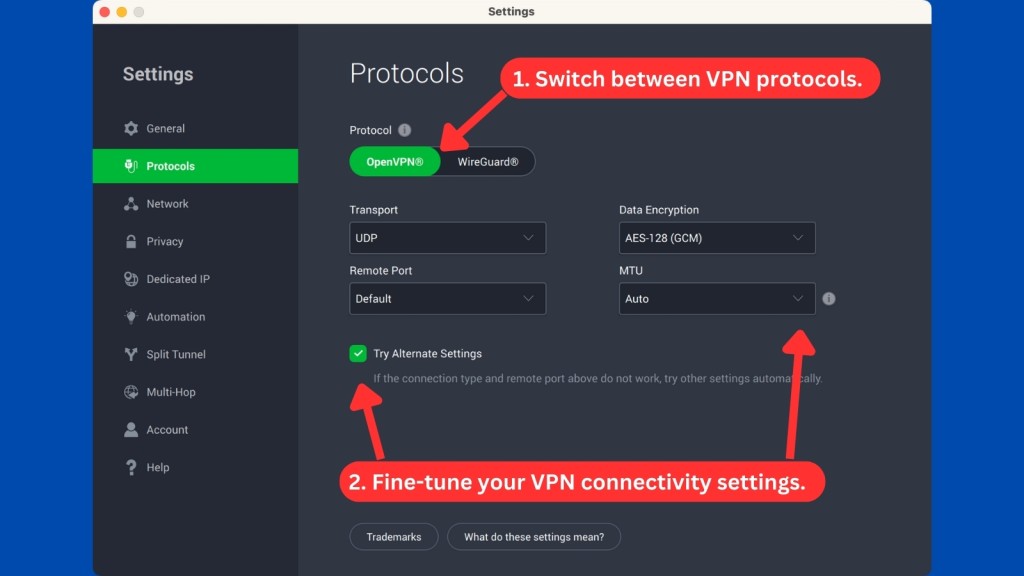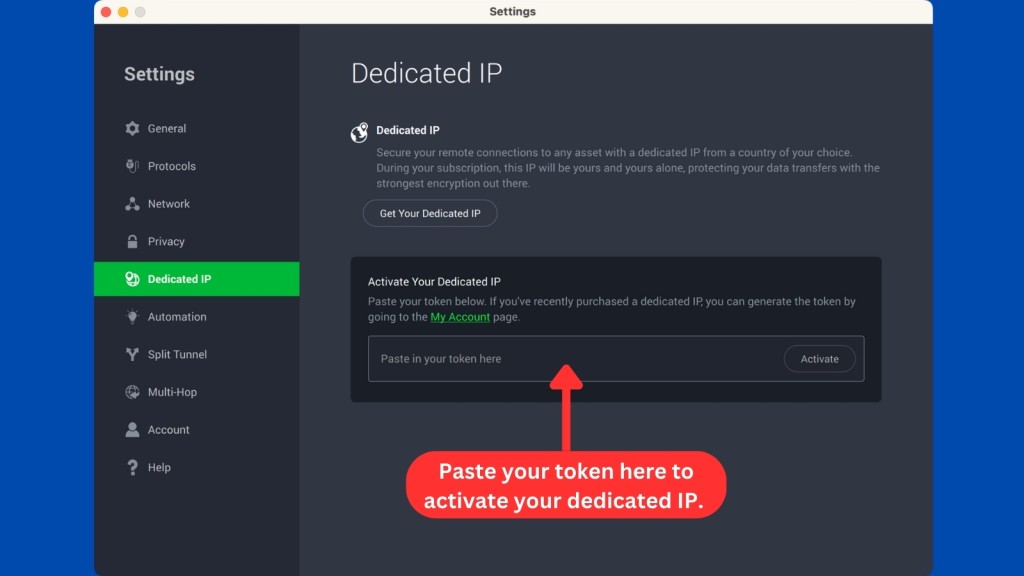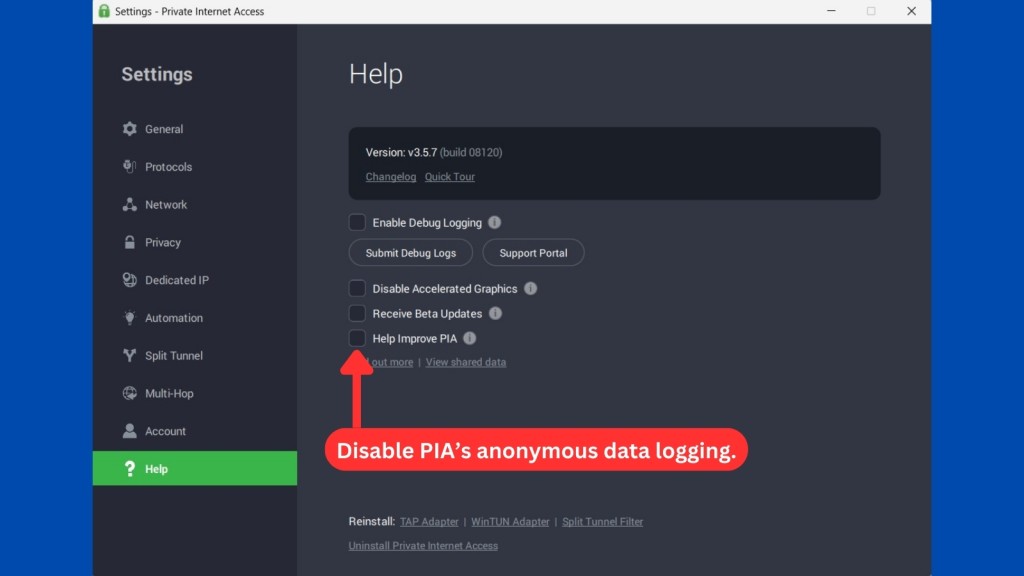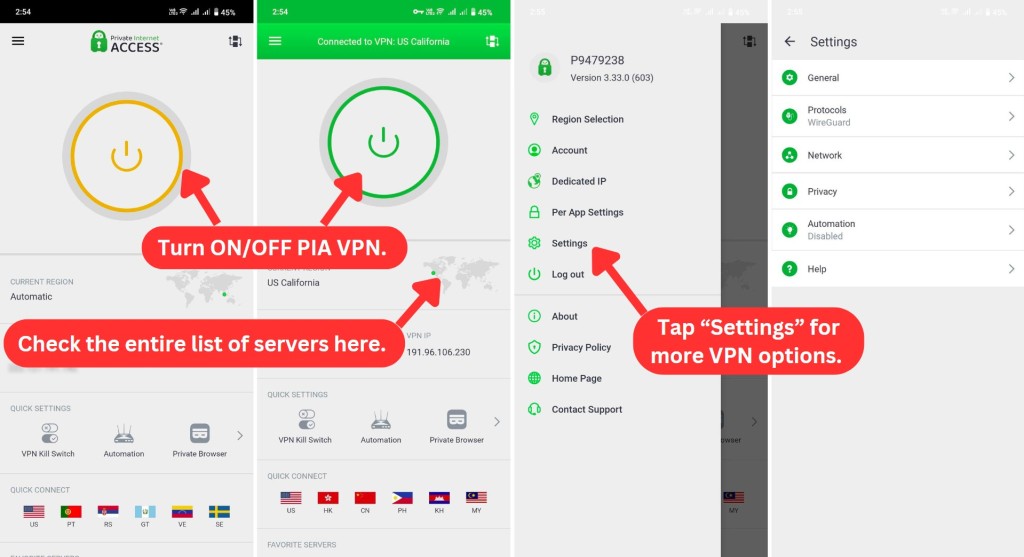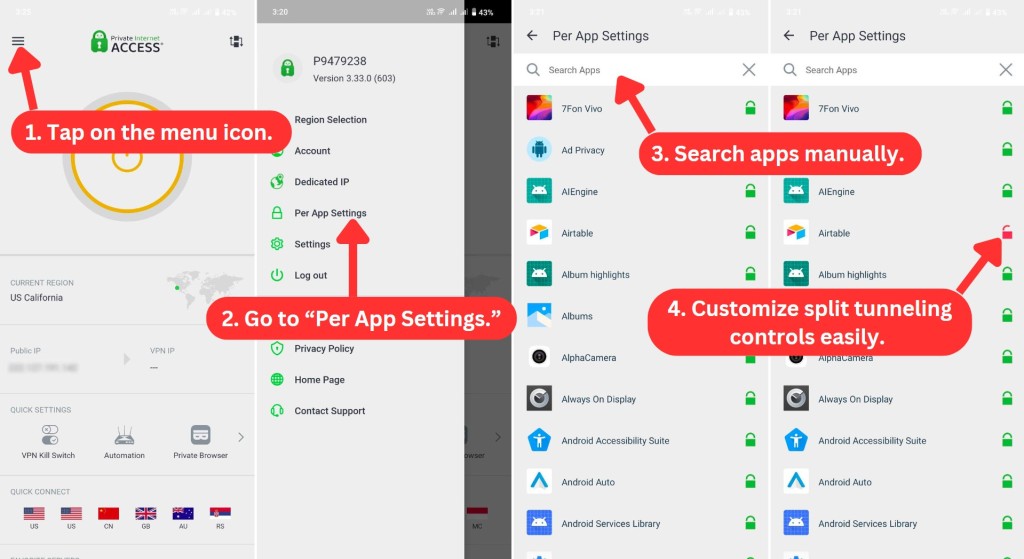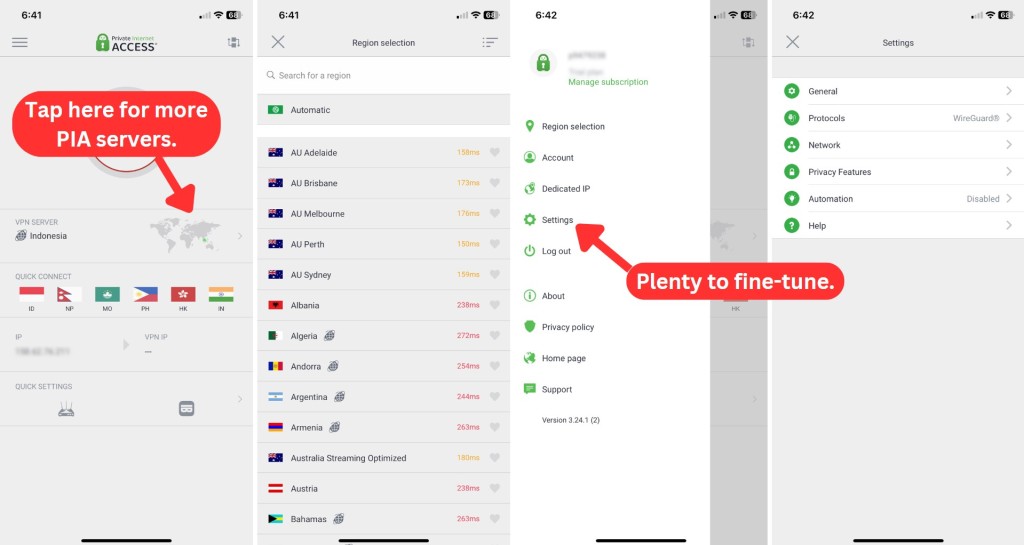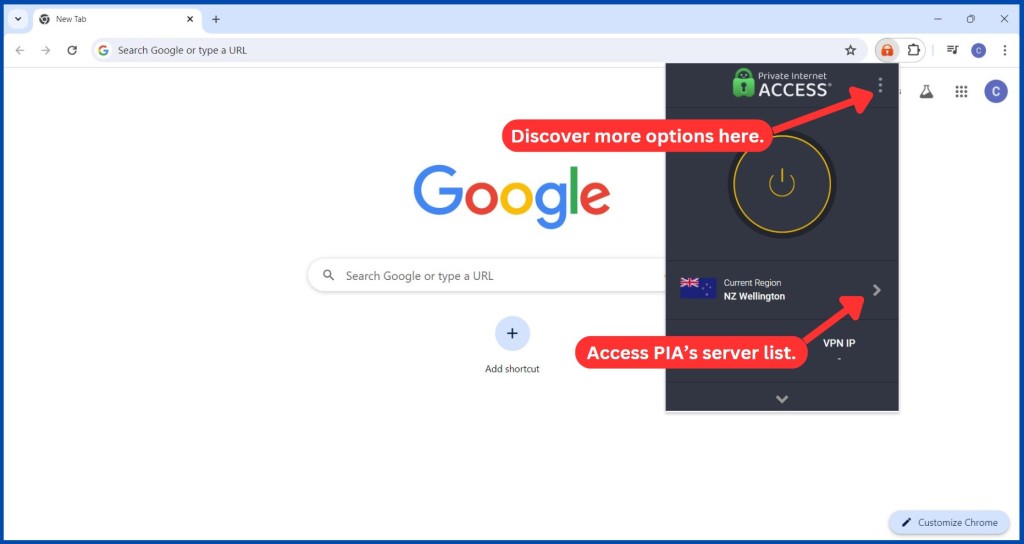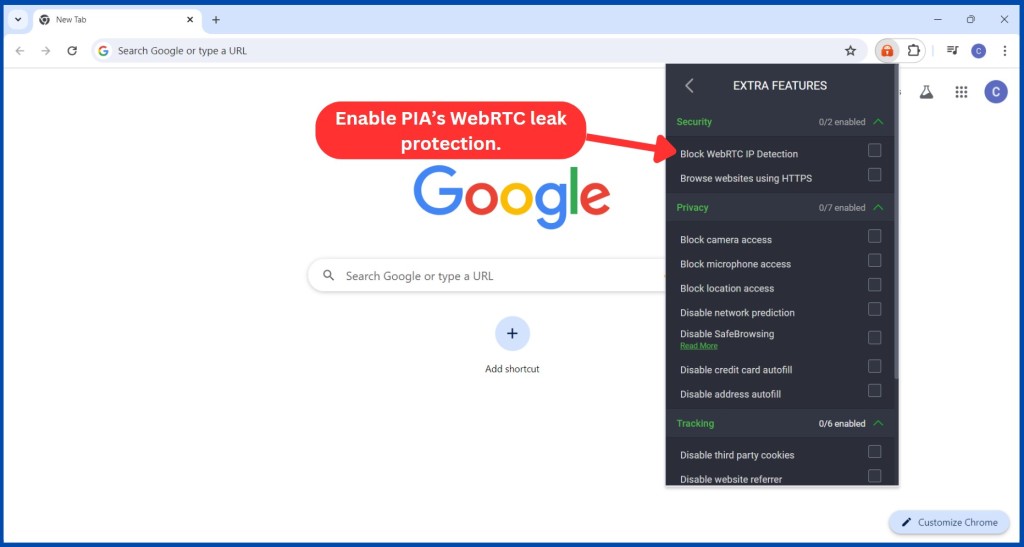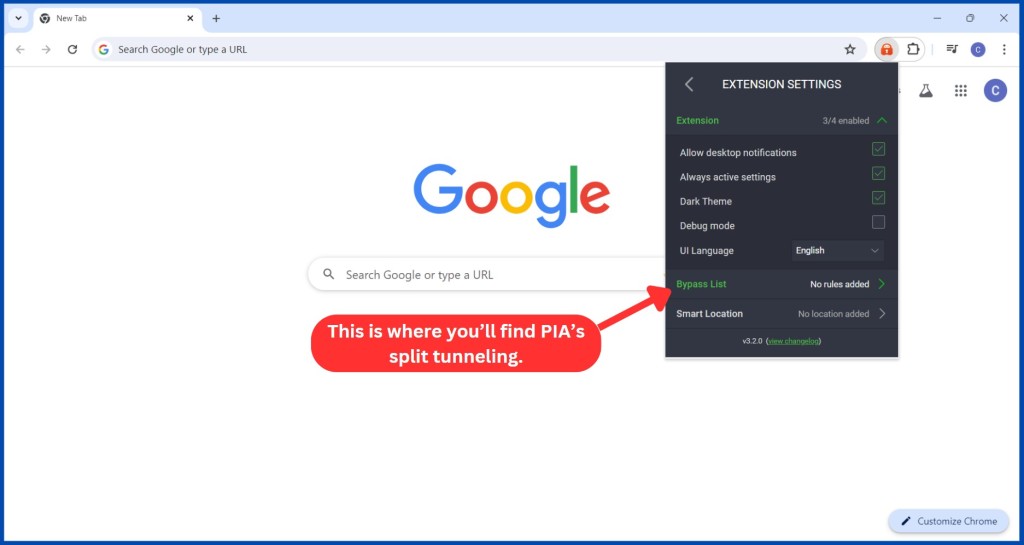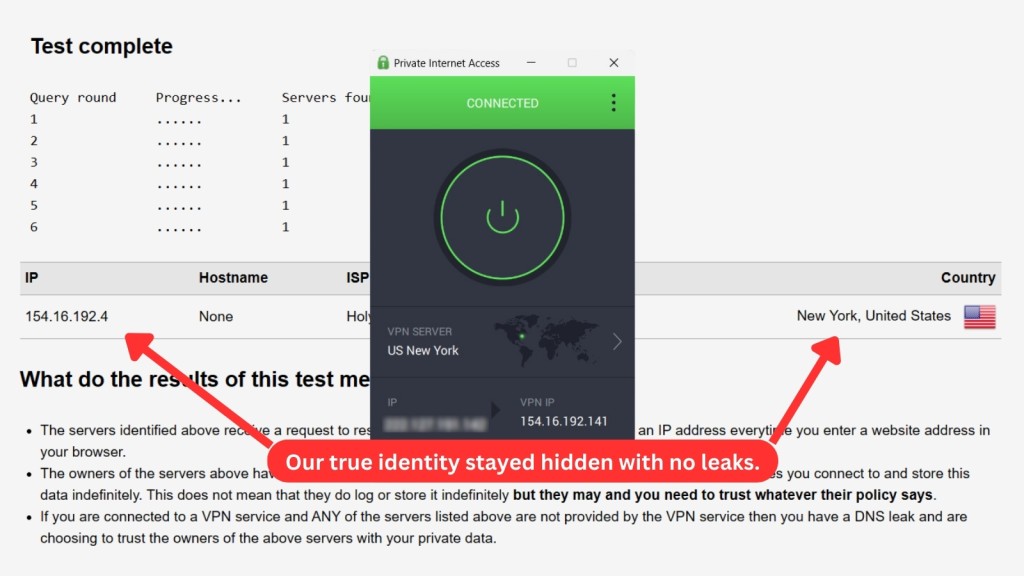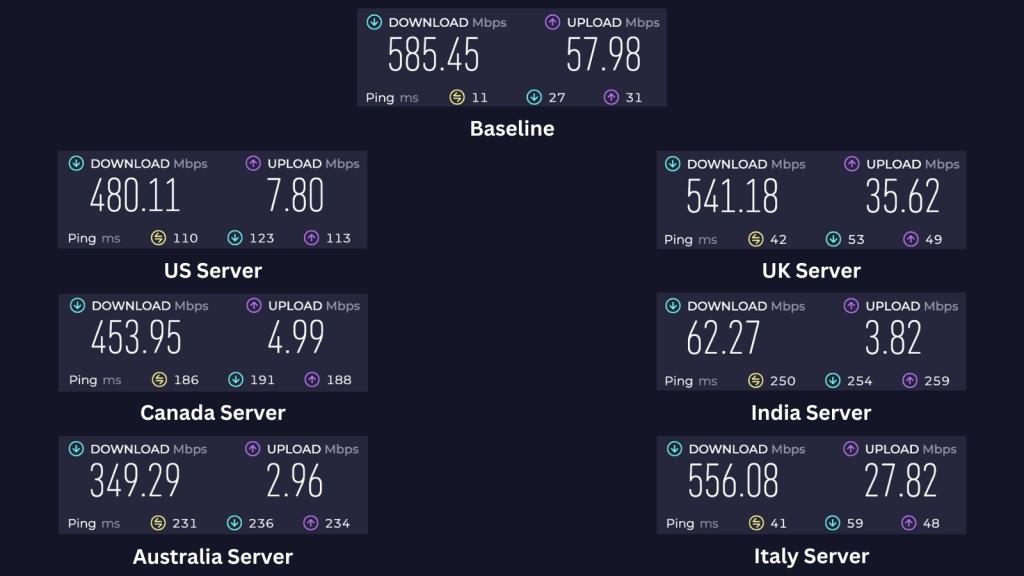
Private Internet Access (PIA) Review 2024: Is It Good and Safe?
When it comes to protecting your online privacy and security, few VPN services compare to Private Internet Access (PIA). It’s one of the best VPN services in the industry and has everything you need to unblock restricted websites or keep your online activity under wraps.
One of the key reasons why PIA stands out from the rest is its commitment to security. It employs robust 128-bit and 256-bit AES encryption and supports WireGuard, OpenVPN, and IPSec (IKEv2) protocols.
But PIA isn’t just about security. It also prioritizes privacy and has a strict no-logs policy. This VPN never keeps a record of your online activities, meaning you can browse, stream, and download without worrying about unwanted third parties.
However, one discouraging fact about PIA is its location. It’s headquartered in the United States, which is considered one of the worst jurisdictions for a VPN company, given that the US is a member of the 5 Eyes Alliance. Despite its location, PIA has proven its commitment to user privacy through multiple real-world verifications and independent audits of its privacy policy and logging practices.
Also, PIA features a high-speed NextGen server network optimized for browsing and streaming. It allows you to enjoy a fast and stable connection, making it easy to stream videos, play online games, and download large files without interruption.
Before we start on our PIA review, here’s a quick overview of its features. It includes all the essential information about PIA, allowing you to make an informed decision.
This review offers a detailed analysis of the Private Internet Access VPN service. To understand the methodologies we use when testing and reviewing VPN services, check out how we review VPN services.
That said, let’s dive into this Private Internet Access review and check out what it has to offer!
Background, Jurisdiction & Reputation
PIA comes from the USA, which isn’t ideal. Also, it’s owned by Kape, a company that owns a number of VPNs. However, it’s also true that PIA has proven in the past that no data logging is involved, which is what matters most. Our Score: 8/10
A VPN acts as your online guardian, so knowing its origins and legal landscape is vital for ensuring your privacy and security. We’ve done in-depth research to assess PIA’s trustworthiness, and here’s what we uncovered.
Where Is Private Internet Access Based?
Private Internet Access (PIA) is based in the United States, particularly in Denver, Colorado. ‘London Trust Media’ was the original owner (and creator) of this VPN service. That company used to own a selection of privacy-related brands covering different types of software, online publications, and more.
Some of the most prominent brands owned by London Trust Media were Linux Journal (which is no longer available), BlockExplorer, FreeNode, Kore Asian Media, and a crypto-based search engine called Private.sh.
In 2019, Kape Technologies acquired Private Internet Access, following previous acquisitions of CyberGhost VPN and ZenMate VPN. Kape Technologies also acquired ExpressVPN for $936 million, becoming perhaps the most dominant VPN company today. All these VPN services now operate under the same company, which also owns the review sites WizCase and vpnMentor.
However, Kape Technologies went private in June 2023, with Unikmind Holdings, a significant shareholder, leading the privatization. Despite being under the Unikmind umbrella, PIA maintains its own distinct identity and privacy policy.
In our article explaining which VPNs are owned by Kape, you can learn more about this company’s turbulent history. However, the bottom line is that we have no reason to distrust Kape Technologies, as all of its VPNs have remained dedicated to their no-logs policies while also expanding their set of features in the meantime.
Even though PIA isn’t proudly showcasing its true location on the home page, it’s not hiding it either. We can understand that, as the USA is perhaps one of the least desirable countries in the world for VPN businesses. After all, there’s the 5/9/14-Eyes Alliance, and there was plenty of talk about Edward Snowden’s NSA revelations.
These revelations are crucial for Internet users because they exposed extensive government surveillance, raising concerns about privacy and prompting a reevaluation of online security practices.
It’s safe to say that the USA is capable of collecting even the most personal data of its citizens, which makes us question whether we should trust PIA in the first place. However, we do believe that this VPN has proven many times before that it truly cares about its customers, as you’re about to find out.
Did PIA Leak Private Data in the Past?
No, PIA hasn’t leaked private data in the past. It’s true that this VPN is located in the USA. However, that doesn’t mean PIA is actively sharing your personal data with third parties. In fact, there are no records of PIA providing access to third parties or leaking any personal information whatsoever.
However, in 2015, Private Internet Access faced an IP address leak vulnerability that could expose the real IP address of its users who were using the port forwarding feature. Further investigation revealed a distinct but related issue with its desktop client. To address these vulnerabilities, PIA promptly released updated VPN apps to ensure the prevention of any leaks.
In 2018, this VPN was forced by the FBI to hand over the personal files of an individual using PIA. However, this company proved its ‘zero logs’ promise by not providing a single file (even when pressured by the FBI). That was a big win for PIA and its no-logging policy.
Is Private Internet Access Safe?
Yes, Private Internet Access is safe. It prioritizes top-tier encryption, offering a choice between 128-bit or 256-bit AES ciphers, trusted by governments and security agencies.
It also secures your connection using robust VPN tunnels, primarily through the OpenVPN and WireGuard protocols. Additionally, PIA has a strict no-logs policy. They don’t keep any record of your online activities, making it difficult for outside parties to track your online activities.
Above all, in 2022, PIA underwent an independent audit by Deloitte Audit Romania and passed with flying colors, confirming its no-logs policy.
However, it’s essential to note that no company or service can guarantee 100% safety. So, it’s always a good idea to be vigilant about your online security and keep an eye on any news or updates about the service.
Supported Platforms & Devices
PIA has done a wonderful job of supporting all popular (and less popular) platforms, including desktop and mobile platforms – and routers as well. Our Score: 10/10
Check out the following table to learn more about Private Internet Access’s currently offered applications and software.
Private Internet Access supports a wide range of platforms and devices. When it comes to desktop systems, you can use PIA natively on Windows PC, macOS, ChromeOS, and Linux (works on Ubuntu, Mint, Arch, or Debian). Also, even quite old machines should run the Private Internet Access app with no issues whatsoever.
Moreover, PIA provides a Chrome extension and browser add-ons for Firefox and Opera. For secure Web browsing on the move, trust PIA’s native apps on iPhone and Android. And for complete home network protection, PIA seamlessly integrates with a wide range of routers, safeguarding smart TVs, gaming consoles, and even Internet-connected appliances.
This is a great way to ensure comprehensive online security for your entire household without needing to install the VPN app on each device.
Lastly, the PIA VPN app is now also available on media streaming devices like Fire Stick, including Chromecast, Apple TV, Kodi, Roku, and other smart TVs, via Smart DNS configuration.
Let’s also not forget to mention that PIA now supports unlimited simultaneous connections. That means you can install PIA’s apps on as many devices as you want – and connect from all those devices at the same time.
Installation & Initial Configuration
You can download, install, and begin using PIA in less than one minute. The installation process is very simple and doesn’t come with any complications. Our Score: 10/10
In this section, we’ll show you how to download PIA VPN on your device and get it ready. The process is impressively seamless, and it doesn’t demand any prior technical expertise.
How to Download and Use Private Internet Access?
Getting started with PIA is incredibly easy. You have two convenient options: either through PIA’s official website or your device’s app store. For the most streamlined experience, we recommend getting the Private Internet Access VPN app directly from its official website.
Here’s a simple guide to download and use Private Internet Access on a Windows device:
- Subscribe to PIA VPN via any Web browser.
- Download the official app from PIA’s website.
- Run the installation file to install Private Internet Access.
- Once installed, log in using your credentials.
- Connect to a server to secure your Web connection. That’s it!
When it comes to other platforms, the installation procedure is very simple as well. In case you get stuck along the way, you can always return to PIA’s website and read the installation guides. All in all, this is a very easy and straightforward process.
Prominent Features
Even though PIA comes with a strong and very interesting feature set, it does things a bit differently. Still, it’s a very capable and reliable VPN solution. Our Score: 9.5/10
PIA has been around for a long time as a VPN provider, and it has kept up with the competition by adding new features over the years. In this section, we’ll see how well PIA meets our standards for a good VPN service and explore some of its key features.
Here’s a breakdown of the features you can expect from PIA:
- DNS and IP Leak Protection: Without any surprise, PIA VPN is capable of creating an ultra-tough VPN tunnel. That means you won’t have to worry about DNS or IP leaks, so no one will know what you do online. Just like its direct competitors, PIA can protect you from IPv4 and IPv6 leaks.
- High-End Encryption: Whether you’re browsing, streaming, gaming, or shopping, PIA VPN will keep your data encrypted and your identity hidden with its 128-bit AES and 256-bit AES encryption. These are the same levels of encryption trusted by the military to protect their secrets. They’re virtually impossible to crack.
- Kill Switch: PIA’s kill switch feature works on all its apps, which means you can use it on Windows, macOS, Linux, Android, iOS, and more. While the app enables the “VPN Kill Switch” by default, the “Advanced Kill Switch” goes a step further. This feature completely blocks your Internet connection before the app launches, ensuring your privacy even before you connect to the VPN. This is particularly helpful for secure downloads.
- Split Tunneling: PIA offers split tunneling on Windows, macOS, Linux, and Android. The only platform that doesn’t have this feature is iOS. The service used to have a very complex set of split tunneling options. But to simplify things, PIA redesigned their apps recently. Now, setting up split tunneling is a breeze, even if you’re new to this feature.
- Dedicated IP Addresses: PIA offers dedicated or static IP addresses for an extra $2.50 per month. This VPN service has a token-based system to safeguard your privacy. You’ll be responsible for activating your (random) token, so PIA’s team won’t know the IP address linked to your account. Dedicated IPs are available in 26 locations. You can choose locations from countries like Belgium, Sweden, the US, Australia, Canada, Switzerland, Germany, the UK, Japan, and Singapore.
- Ad-Blocker: Private Internet Access has a feature called ‘MACE.’ It blocks ads, trackers, and malware. It works seamlessly on Windows, macOS, Linux, and Web browsers. For Android users, the MACE feature is currently available through the PIA app (APK), downloadable directly from their website. This feature routes your traffic through a special DNS process run by PIA. In simple terms, PIA has a blacklist of bad domains and stops them from loading. However, keep in mind that PIA’s MACE is “off” by default. You can turn it “on” in the app’s settings (Settings > Privacy).
- Obfuscation: VPNs shield your data, but they can still reveal if you’re using one. This can be risky in certain regions or under restrictive networks. Top VPNs like PIA counter this with obfuscation, making your VPN traffic appear indistinguishable from regular Web traffic, effectively hiding VPN use from your ISP.
- Multi-Hop: To further enhance your privacy, PIA lets you use a proxy to reroute the VPN connection through an extra location. This feature, which is available on Windows, Mac, and Linux, adds an extra layer of anonymity, especially in P2P activities.
- SOCKS5: Use this handy tool if you want to hide your IP address while engaging in torrenting and Web scraping activities, as well as accessing geo-restricted content. Thanks to its non-encrypted nature, the SOCKS5 proxy ensures a notably faster connection. But keep mind that while it offers speed advantages, it doesn’t provide the same level of security as a VPN. To activate this feature, access the “Multi-Hop” setting in all desktop apps supported by PIA.
- Port Forwarding: This PIA VPN feature allows you to securely access devices or services from anywhere. It works by opening specific ports on your device, enabling seamless connections for tasks like online gaming or remote access to your home network. This feature is available on Windows, macOS, and Linux, including Android devices.
- Unlimited Server Switches and Bandwidth: The service gives you unlimited access to its global network of servers. You can switch between servers as often as you want without any extra fees or limitations. PIA VPN also lets you use as much data as you need without any caps or throttling.
Server Count & Infrastructure
Spanning 90 countries, PIA boasts one of the largest server networks, though many are virtual. Yet, their colocated, RAM-only, and 10 Gbps servers offer physical control, enhanced security, and faster connections. Our Score: 9/10
VPNs that offer a large number of servers can more easily accommodate numerous users at once. So, here’s how Private Internet Access ranks in that aspect.
In the past, the VPN service used to have a dedicated page on its website, providing the exact number (and locations) of Private Internet Access servers. Throughout 2020 and 2021, that number ranged from 17,500+ to 30,000+ as the VPN switched to its “NextGen” network.
To help you make sense of those numbers, we’ll say that VPNs with the most servers have 3,000 to 6,000 server units in their networks. With that said, we’re not exactly sure how PIA used to count the number of servers it had on its network. When asked about using virtual servers, for example, PIA told us that only a limited number of virtual servers exist in its network.
In any case, it’s obvious that PIA offers a massive server list. Still, what’s even more important is that PIA’s server locations span over 90 countries.
Let’s also not forget to mention that you can connect to specific cities within certain countries, such as the USA, Canada, Germany, the UK, and Australia. Furthermore, PIA is the only VPN that offers servers in all 50 US states. So, if you need an IP associated with a specific US state to bypass blackouts or access your bank account from abroad, PIA is the right pick.
Beyond dedicated 10 Gbps Internet lines for smooth data flow, PIA also uses colocated servers. These physically controlled servers, equipped with 10 Gbps network cards and operating solely on RAM, aim to minimize potential slowdowns and data leaks, contributing to a potentially faster and more secure VPN experience.
Lastly, PIA offers obfuscation via Shadowsocks. It cleverly disguises your VPN traffic to make it seem as if you’re browsing the Internet without a VPN. The obfuscation feature is exclusively accessible on Windows, macOS, Linux, and Android devices.
On Windows, you can access it through Settings > Multi-Hop > Multi-Hop and Obfuscation. Next, click “Edit” on Shadowsocks to choose from a selection of 9 obfuscated servers. Remember, this feature requires OpenVPN, so make sure your protocol is set accordingly before proceeding.
Does Private Internet Access Use Virtual Server Locations?
Yes, PIA uses a number of VPN virtual locations. These are so-called ‘geo-located servers,’ available in countries where using a VPN can be restricted.
In other words, PIA’s geolocated region isn’t physically available on its ‘end’ countries. Still, once you connect to one, you’ll get an IP address associated with the chosen country. All your virtual information will correspond to the selected country, just like when connected to a physical server.
PIA doesn’t hide the fact that it’s using a number of virtual locations, and those are clearly labeled in PIA’s apps and its website.
UI/UX Design & Ease of Use
PIA now has a brand-new UI design that looks great on both small and large screens. It can be a bit confusing at first (especially if you’ve never used a VPN before), but it’s highly usable and customizable. Our Score: 9/10
In this segment of our Private Internet Access VPN review, we will take a close look at PIA’s desktop and mobile software. And since this VPN offers Web browser extensions, we won’t forget to check those as well.
How Well Does PIA Work on Desktop Platforms?
When you launch the Private Internet Access app for the first time, you’ll see its ‘compact‘ version, whose interface allows you to quickly select a server and connect. It provides some basic information as well, like your real IP and your VPN (virtual) IP address.
To expand that information, click on the arrow icon found at the bottom of PIA’s ‘compact’ UI. That action will expand PIA’s options, allowing you to connect to specific locations quickly, check the real-time performance and data usage, and there’s a quick settings panel and more.
At any moment, you can ‘bookmark‘ any of those segments if you want them to become part of the ‘compact’ UI. That means that PIA brings a high level of customization. Let’s not forget to mention that you can choose from two themes (dark and light), both of which look amazing.
When choosing a server, you’ll be presented with a sizeable list of countries. You can mark any of those as your favorites so you can easily connect to them in the future. PIA also provides an option to connect you to the best available server, which depends on your physical location.
Lastly, don’t forget to take a peek behind the ‘three dots’ icon, found in the top-right corner. This is where you’ll find additional options and settings. So, here’s what to expect here:
- General: This is where you can set Private Internet Access to launch on system startup and connect to a specific server automatically. Then, you can choose from more than a dozen different languages, switch between different themes, and more.
- Protocols: As the name of this tab implies, this is where you can change PIA’s protocol. Unlike other VPN services, this one lets you dive deep into customizing your connection. When it comes to OpenVPN (for example), you can pick the type of data transport, encryption, as well as remote and local ports.
- Network: In case you’d like to use a different (custom) DNS and port forwarding, you can find those options there. Also, you can easily enable/disable LAN traffic between your local devices.
- Privacy: Three options are present here. You can enable the VPN’s kill switch or turn on PIA’s MACE, which blocks malicious domains with aggressive ads, trackers, and malware. PIA offers an ‘Advanced Kill Switch’ as well, blocking any traffic from going outside the VPN, even when the VPN is disabled.
- Dedicated IP: As mentioned above, Private Internet Access now offers dedicated IPs, priced extra. If you decide to get one, you’ll need to use the ‘Dedicated IP’ tab to activate your token, which is generated using your ‘My Account’ page on PIA’s website (recently redesigned).
- Automation: Using this tab, you can instruct PIA to connect or disconnect from its servers once your computer joins a specific Wi-Fi network. That’s how, for example, you can instruct PIA to protect you using a public Wi-Fi network and then turn it off once you enter your home.
- Split Tunnel: A recent update to PIA’s apps gave split tunneling its own section. That should make it easier to set up various split-tunneling options by adding applications or IP addresses and then letting PIA know whether to route its traffic through its servers.
- Multi-Hop: This tab allows you to add an extra layer of protection by including an additional proxy in your Web traffic flow. There are two types of proxies available in this scenario: Shadowsocks or SOCKS5 proxy. PIA allows you to pick a country, which will be the location of the additional server that will route your Web data. The purpose of using this type of obfuscation is to hide that you’re using a VPN app.
- Account: If you’d like to see when your subscription is due to expire, this is where you can check that information. You’ll also find links that let you manage your account and log out.
- Help: Lastly, this is where you can do maintenance tasks that can resolve certain problems, such as reinstalling the network driver, submitting debug logs, and more.
As you can see above, PIA offers a huge number of customizations. With that said, it’s oriented toward those who wish to control their VPN connection in depth.
Inexperienced users will also find their way through PIA, even though some other VPNs might offer a more suitable environment for that early stage of entering the world of VPNs.
How Well Does PIA Work on Mobile Platforms?
PIA has done a magnificent job of creating a series of uniform apps for all of its supported platforms. This also applies to PIA’s mobile apps, which are highly polished.
On Android, you’ll see a customizable home page. Without going deeper into the app, you’ll get to connect to servers, check your ‘real’ and ‘virtual’ IP, toggle certain settings, snooze the VPN, and more. Of course, all of those segments can be enabled or disabled, which is done by clicking on the ‘Home Screen Edit’ button (found in the top-right corner).
The PIA app for Android has more options if you tap the ‘hamburger’ button in the top-left corner. This is where you can review the list of available servers (‘Region Selection‘), review your account information (‘Account‘), activate a dedicated IP, fine-tune split tunneling (‘Per App Settings’), and play with PIA’s settings.
Speaking of the settings panel (‘Hamburger’ button > Settings) of PIA’s Android app, there’s plenty of customization. This is where you can enable the kill switch, block IPv6 traffic (via OpenVPN protocol), block local traffic, set up the VPN’s encryption level, and more. You can even set up PIA to auto-launch on system start, keeping you protected at all times.
Then, we also have PIA’s iOS app. For the most part, this one looks closely identical to the Android app. This means that you get a customizable home screen that can be as simple or as complex as you want it to be.
Once again, diving deeper is done by using the ‘hamburger’ button. That’s where you’ll find a list of PIA’s servers, information related to your account, and the app’s settings (which are more limited than what you’ll find on Android).
When it comes to fine-tuning on iOS, you can pick a different protocol, set up a custom DNS, set up PIA’s level of encryption, force the app to use small packets, and enable/disable the kill switch. All in all, even advanced users should be happy with this app.
How Well Do PIA’s Web Browser Extensions Work?
We have to say that the Private Internet Access VPN extension is probably the best VPN extension we’ve tried so far. They’re packed with highly useful features that make a big difference in the way you interact with the Web.
Private Internet Access comes with extensions compatible with Chrome, Firefox, and Opera. However, keep in mind that you’ll need a PIA account to use them (therefore, they don’t come free of charge).
As PIA features a uniform design across all of its software creations, this also applies to its Web browser extensions. The home screen lets you connect to servers, toggle quick settings ON or OFF, and more. However, the real power of these extensions is found behind an icon in the top-right corner, where you’ll find ‘Extra Features.’
PIA’s Web browser extensions allow you to block WebRTC leaks, force your browser to use HTTPS, as well as block access to your camera, microphone, location, data autofill, and plenty more. And in terms of tracking, you can disable cookies, block ads, and more.
It’s also worth noting that split tunneling is available via PIA’s Chrome extension, including Opera and Firefox extensions. This feature is found by going to Extension Settings > Bypass List. You’re free to add any URL here, which will force PIA to route you to those domains outside of its secure tunnel.
All in all, PIA’s extensions for Web browsers are hugely capable. Unlike what other VPNs offer, these extensions aren’t an afterthought. Instead, they bring genuinely useful features designed to protect your digital privacy.
PIA’s 10 Gbps network infrastructure delivers fast speed across all their servers, so you can enjoy buffer-free streaming, efficient P2P sharing, and lag-free gaming. Plus, with unlimited bandwidth, you never have to worry about hitting data caps. Our Score: 8/10
One of the main reasons why people use VPNs is to access various types of online content, like streaming services, torrenting sites, or gaming platforms. However, not every VPN can handle these tasks equally well. That’s why we’ve put PIA to the test and evaluated its performance in these areas.
Is Private Internet Access Good for Streaming?
Yes, Private Internet Access (PIA) is a good VPN for streaming. We say that because it lets you stream movies and TV shows from different platforms across the globe.
Here are some of the most notable US-based streaming platforms this VPN unblocks.
The provider is equally good with platforms outside the US. Here are some non-US streaming services you can enjoy with this VPN.
It’s important to note that not all PIA servers work with Netflix. While some servers can unblock Netflix, many don’t. This means you might have to try several servers before finding one that works. In addition, PIA has servers optimized for media streaming. These servers are more likely to work with Netflix and other streaming platforms.
So, if you want access to both US- and non-US-based content, Private Internet Access for streaming is a reliable choice. Want to check out other VPNs with streaming-optimized features? Read our guide for the best VPN for streaming.
Is Private Internet Access Good for Torrenting?
Yes, Private Internet Access for torrenting is good. First of all, PIA supports torrenting on its servers spread across different regions around the world. It’s also compatible with many clients, including qBittorrent and uTorrent.
Second, it has a strict no-logs policy that ensures your online activity is never recorded or stored. This means you can torrent with peace of mind, knowing that your privacy is protected at all times. In addition, PIA has advanced security features such as a kill switch and DNS leak protection, which prevent your real IP address and DNS requests from being exposed to third parties.
On top of that, PIA supports port forwarding, which allows you to open specific ports on your connection and improve your torrenting speeds. If you want to explore other options, check out our article about the best VPN for torrents.
Is Private Internet Access Good for Gaming?
Yes, PIA is good for gaming and a serious contender for the best gaming VPN title. For starters, it has a blazing-fast 10 Gbps server network for optimal gaming performance. PIA also supports port forwarding, which can improve your connection’s stability and reduce lag. That’s a big deal for online gaming, where every millisecond counts.
Whether you’re conquering worlds on your Steam Deck or battling it out in League of Legends, PIA offers features that prioritize your online safety and security. Its kill switch feature automatically disconnects you from the Internet if your VPN connection drops, preventing your real IP address and location from being exposed. Additionally, it has DNS leak protection to protect you from DDoS attacks and other online threats that could ruin your gaming session.
According to our tests, PIA VPN has an average ping of 30 ms and an average latency of 40 ms, which are decent for gaming. Plus, you can extend PIA’s protection to your gaming consoles through a simple router configuration, creating a comprehensive security shield for your entire gaming setup.
Security & Privacy
Private Internet Access has a reputation for protecting its users, even once police organizations such as the FBI come knocking at their doors. So, even though it’s based in the US, which isn’t ideal, there are a lot of reasons to trust this VPN. Our Score: 9/10
You must be wondering how effective PIA is when it comes to protecting your private data. In this PIA VPN review, we’ll be taking a look at three aspects of this VPN service: VPN protocols, its logging policy, and the prevention of IP/DNS leaks.
Private Internet Access VPN Protocols
PIA comes with a comprehensive set of VPN protocols, such as OpenVPN, WireGuard, as well as IPsec (IKEv2). The following table will show you a list of PIA’s applications, along with the VPN protocols supported by each of those apps.
As you can see above, PIA brings OpenVPN and WireGuard across all its apps. Then, there’s IPsec (IKEv2) available on iOS as well. All of those are incredibly secure protocols, giving you some room to choose between security and performance.
In the past, PIA supported PPTP and L2TP. Even though you can still find guides on how to set up those protocols manually, keep in mind that PIA is moving away from those two protocols. This goes hand-in-hand with the VPN’s ‘Next-Gen’ infrastructure, with legacy servers being left behind.
- OpenVPN: This is known as the most secure and stable VPN protocol, being used across numerous VPN services. Even though this protocol will slow you down a bit, it brings an unparalleled level of security to your private data. It uses AES-128-GCM and AES-256-GCM key lengths within PIA for maximum online protection.
- WireGuard: This one is a brand-new VPN protocol that comes with plenty of promises. Most importantly, it’s incredibly lightweight with ChaCha20 encryption. That means that connecting and disconnecting from servers is done instantly. You can also expect incredibly fast Web speeds.
- IPsec (IKEv2): PIA uses this protocol on iOS, which is known for its stability and security. However, it’s primarily designed for mobile devices. That’s how you can easily switch from a 4G/5G network to a Wi-Fi connection without losing connectivity. For this protocol, you can choose between AES-128-CBC and AES-256-CBC encryption algorithms.
Does Private Internet Access Keep Logs?
No, PIA doesn’t keep logs — it has a strict no-logs policy. It doesn’t keep records of your online activities at all. This VPN doesn’t store any information that could be used to identify you or your online activity.
PIA’s no-logs policy has also undergone an independent audit and is designed to protect the privacy and security of its users. This policy is an essential aspect of its service, as it ensures that users can browse, stream, and download content without worrying about their online activities being tracked or recorded.
However, it’s important to note that PIA does collect some minimal data, such as the amount of data you use, the date and time of your connection, and the server location you connect to. This information is used to troubleshoot technical issues and improve the service, isn’t linked to any identifiable information, and is regularly deleted.
Does PIA VPN Leak/Expose Your Private Data?
No, PIA VPN doesn’t leak or expose personal data. We’ve done a DNS leak test while connected to different PIA servers. With that said, we’re happy to report that PIA seems to be incredibly secure, with no leaks detected.
More precisely, we’ve checked for IP, DNS, WebRTC, and geo-location leaks. PIA’s VPN tunnel seems to be incredibly strong, not allowing anyone to get to our private information. Instead, our ‘virtual’ information is what’s visible, without any surprises.
Speed & Performance
PIA brings incredibly fast and stable connections to nearby and remote servers, especially if you take your time to optimize this VPN for performance. Our Score: 8/10
In this part of our review, we’ll see how PIA VPN affects our connection speed. We’re doing this test on a 600 Mbps connection. Our baseline speed test showed 585.45 Mbps for PIA download speeds and 57.98 Mbps for uploads. That’s our ‘naked’ connection without the VPN. Next, we’ll connect to different servers around the world and compare the results.
Recognizing that VPNs often come with a speed trade-off, we evaluated PIA’s performance to see if it could hold its own among the fastest VPNs.
Here are the results of our other server tests:
- USA Server (Chicago): Despite the server’s distance, the download speed held up remarkably well, only dropping by 18% from 585.45 Mbps to 480.11 Mbps. This minimal speed loss indicates the US server’s strong connection and good long-distance traffic handling capability. The overall performance is impressive, even with an upload speed of only 7.80 Mbps.
- UK Server (Southampton): Similar to the Italy server (below), this nearby server only had a 7.6% speed reduction. Download speeds were up to 541.18 Mbps, and upload speeds reached 35.62 Mbps – both impressively fast.
- Canada Server (Vancouver): This server, located far away, performed similarly to PIA’s US server, with a speed reduction of 22.5%. Even with this distance, the download speed remained decent at 453.95 Mbps, and the upload speed was 4.99 Mbps.
- India Server (New Delhi): Out of all the servers tested, this one, the farthest from us, lived up to its remote location in terms of performance. The connection took a nosedive, dropping a staggering 89% to settle at a meager 62.27 Mbps download and 3.82 Mbps upload. While the server managed to maintain some functionality despite the distance, its performance clearly suffered compared to closer options.
- Australia Server (Sydney): While geographically remote, this server delivered a more acceptable download speed of 349.29 Mbps compared to the Indian server. This represents a 40% speed reduction, ranking second-slowest in our tests.
- Italy Server (Milano): Although it’s the closest server to our location, we still anticipated some speed reduction with this Italian server. However, PIA VPN surprised us with a stable connection and a negligible 5% speed drop. Its impressive download and upload speeds (556.08 Mbps and 27.82 Mbps, respectively) surpassed our expectations.
Our test results show that our PIA speeds slowed down by 30% on average compared to the baseline speed. Nevertheless, the service has done a great job of optimizing its servers for speed and performance. That said, be aware that your upload speed will be noticeably throttled if you use overly remote servers.
Customer Support
PIA comes with many support channels available, including live chat. We’re happy to report that they offer 24/7 client support and that their reps are very responsive and helpful. Our Score: 10/10
It’s crucial for VPN services to offer reliable customer service. That’s because they are highly complex technical solutions, and something can easily go wrong – which is why you need to know if help is on the way. Here are all the ways that PIA helps its customers.
- Live Chat: We are happy to see PIA reintroduce live chat via its official website. This option was abandoned a few years back, but now you can once again talk to this VPN’s customer support agents in real time and resolve your issue quickly.
- Knowledge Base: PIA has prepared around 200 articles on solving different technical problems. They also have a pretty neat search function that retrieves results from different categories (news, files, tickets, guides, etc.).
- Setup Guides: No matter your platform of choice, you’ll find a nice range of setup guides. These come with clearly explained steps accompanied by screenshots, making it easy to install Private Internet Access on any of its supported platforms.
- Email Support: In case you can’t find a solution to your problem in some other way, you can contact the company via email. Actually, you can contact them via a contact form, but you’ll receive a response via email.
Additionally, PIA VPN offers a blog with news and articles, active social media channels (Facebook, X), a YouTube channel, and a subreddit community for further support and interaction.
Pricing
Private Internet Access VPN is one of the most affordable VPNs on the market (in the long term). Overall, its price seems fair enough. Our Score: 9/10
Now, it’s time to check the price of Private Internet Access. Make sure to read this segment carefully, as we’ll unveil a number of interesting tidbits.
How Much Is Private Internet Access?
PIA starts at $2.03/month and offers three subscription plans to suit different needs and budgets. Let’s take a look at the deals below and see what they have to offer.
- 1-Month Plan: If you need a VPN for a short time or want to try the service first, the monthly plan might suit you. It lets you pay as you go, but it’s also the priciest option at $11.99 per month. You also won’t get a discount with this plan, so it’s not very cost-effective.
- 6-Month Plan: This plan is a perfect balance between flexibility and cost-effectiveness, as you only pay $45.00 every six months, which is $7.50 per month. That means you’ll save about 37% compared to the monthly plan. You also get 500 GB of free cloud storage from pCloud for a full year with this plan.
- 2 Years (+ 4 Months Free): PIA’s long-term plan is the best value for money. For just $56.94, you get 2 years of subscription and 4 months free, along with a complimentary 500 GB of cloud storage for one year. This plan will only cost you $2.03 per month, which is a whopping 83% savings compared to the monthly plan. If you need a VPN for a long time or want to get the most out of your money, get this plan.
PIA also offers an affordable antivirus add-on for Windows 7 and above, starting at just $1.45/month, and a dedicated IP for $2.50/month (when you choose the long-term deal). Whatever plan you choose, you’ll get access to all the features and benefits of PIA VPN, such as unlimited bandwidth, fast speeds, multiple protocols, thousands of servers, and more. You’ll also get a 30-day money-back guarantee, so you can try the service risk-free.
PIA VPN accepts various payment methods, including debit/credit cards, PayPal, Amazon Pay, and even cryptocurrencies. If you value your privacy and anonymity, you might want to pay with Bitcoin or another digital currency, as this will leave no trace of your identity.
Is Private Internet Access Free?
No, PIA isn’t free. However, they do provide a 30-day money-back guarantee, essentially allowing you to use the first 30 days as a trial period.
There’s also a 7-day free trial available for Android and iOS users. However, with the mobile trial, you’ll need to pay upfront and request a refund within 24 hours before the trial ends. Keep in mind that if you purchase through the Apple App Store, third-party websites, or gift cards, refunds can only be processed by those entities, not PIA directly.
For this reason, we recommend buying PIA from its website. This way, you can test PIA risk-free for a month with its 30-day money-back guarantee. If you’re not happy with the service, you can ask for a refund within the first month of your subscription. However, their refund policy states that you can only do this once every three months.
PIA VPN Comparison with Other VPN Providers
PIA’s direct competitors are NordVPN and ExpressVPN, including Surfshark as a runner-up. These VPNs bring high-end privacy protection, sizable server networks, and a plethora of unique features. So, if you’re in doubt about which one to pick, check out the following VPN comparisons.
- NordVPN vs. PIA: These VPNs offer impressive privacy and security features. NordVPN’s location in Panama adds a layer of trust, and PIA’s unlimited connections are a standout feature. The choice between NordVPN and PIA depends on your exact needs and budget as well. NordVPN suits specific purposes, while PIA delivers a vast server network and affordability.
- ExpressVPN vs. PIA: ExpressVPN and Private Internet Access offer similar privacy features and are highly capable VPNs. However, due to PIA’s U.S. jurisdiction, it may not be the top choice for those seeking absolute anonymity online. If affordability is your priority, PIA is a solid option. ExpressVPN, though pricier, offers excellent value, especially with long-term plans.
- PIA vs. Ivacy VPN: Both PIA and Ivacy VPN cater to mainstream VPN users with their sensible feature sets. Ivacy VPN impresses with extensive server coverage, while PIA stands out for its vast server count. But if you prioritize maintaining Internet speed, the choice between the two VPN services leans toward PIA.
- TorGuard vs Private Internet Access: PIA boasts unlimited device connections, cheaper long-term plans, and presence in more countries, potentially making it a sweeter deal. However, if specific features are your priority, TorGuard might be worth exploring further. But keep in mind that both VPNs operate within the 5-Eyes Alliance jurisdiction, so consider potential implications for data privacy.
Final Thoughts – Is Private Internet Access a Good VPN?
Yes, Private Internet Access is certainly a good VPN. It has a powerful combination of security protocols, privacy features, and high-end performance.
Its high-speed server network, advanced encryption, and strict no-logs policy make it an excellent option for anyone looking to improve their online security and privacy or unblock websites. Whether you’re a movie buff, a gamer, or just someone who wants to stay connected to the world, PIA has got you covered.
But remember, PIA is a US VPN owned by a very large corporation. Some might worry about this, but PIA hasn’t been caught logging data, even when pressured by the FBI. With that said, we believe that many of you will be perfectly happy with this VPN.
So, if you’re looking for a VPN provider you can trust, we strongly recommend PIA VPN.
PROS
- Doesn’t log private data (audited).
- Highly polished applications.
- Works on practically any device.
- Huge army of servers.
- Unlimited simultaneous connections.
- Plenty of fine-tuning available.
- Great for more advanced users.
- Ultra-powerful VPN protocols.
- Works with Netflix and Disney+.
- Supports P2P traffic on all servers.
- Anonymous payments available.
CONS
- Based in the United States.
- Limited upload speeds.
- Best-suited for more advanced users.
- Can be overly technical for some.
|
Review Summary Despite its minor drawbacks, PIA provides a lot of value for its price. Most importantly, it’s a trusty VPN, quick to develop new features, helping you stay safe online. |
9 Overall Score |
||
| Background, Jurisdiction & Reputation | 8 | ||
| Supported Platforms & Devices | 10 | ||
| Installation & Initial Configuration | 10 | ||
| Prominent Features | 9.5 | ||
| Server Count & Infrastructure | 9 | ||
| UI/UX Design & Ease of Use | 9 | ||
| Media Streaming, Torrenting & Gaming Support | 8 | ||
| Security & Privacy | 9 | ||
| Speed & Performance | 8 | ||
| Customer Support | 10 | ||
| Pricing | 9 | ||

